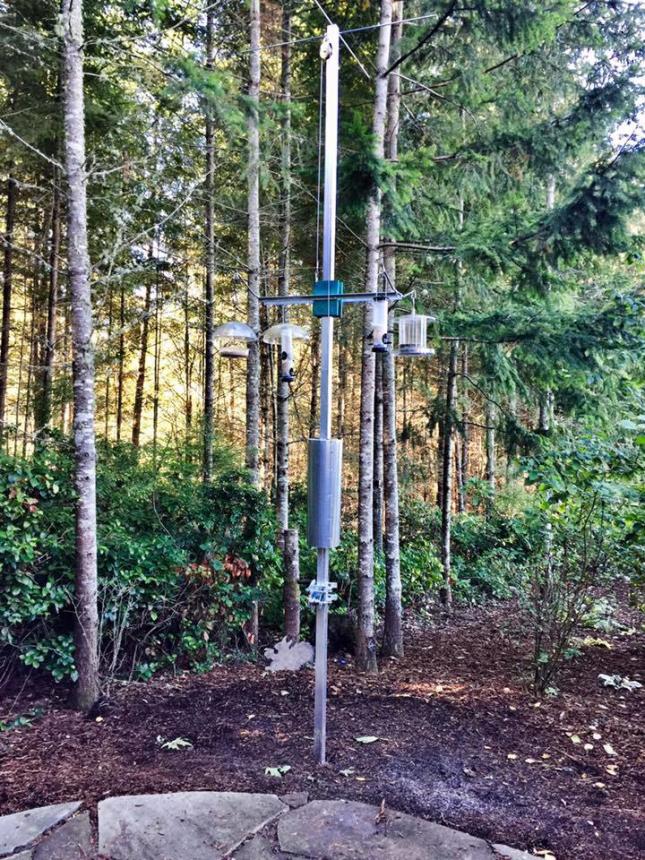Dealing with Bears at Your Feeders 
There’s no denying that bears will take advantage of backyard bird feeders, as well as garbage, compost, fruit trees, berry bushes, barbecues, pet food and refrigerators/freezers store outdoors.
Here are some practical tips for communities, especially March through November:
- Keep garage doors closed.
- Attractants can be odors and entice bears to the areas.
- Garbage, keep in containers, in fact don’t leave containers outside since put in the garage if possible.
- Keep windows and doors closed so odors don’t temp bears to come inside.
- Don’t leave trash, animal food, coolers outside.
- Bears are also attracted to fruit-bearing trees/bushes or gardens in your yard.
- Burn your barbecues clean immediately after use. It’s also helpful if you can store the barbecue indoors when not in use.
- Do not feed pets outside or leave dog bones in the yard.
- Composters can also be an attractant. Keep clean. Above all, do not put meat scraps in composters
It is possible to make bird feeders inaccessible to bears. Here are some suggestions on how to bear-proof your bird feeders:
Sometimes a simple solution is change the bird food Feed bird foods coated with hot pepper or capsaicin products which can effectively deter squirrels and other critters. People, rodents, and other mammals feel the burn when they eat peppers. Birds do not. The heat of a chili pepper is not a response by taste buds. The burning feeling actually comes from the body’s pain response system. The capsaicin found inside the pepper activates a receptor protein in a mammal’s tissue called TRPV1. When it does, it alerts the brain. The brain then responds by sending a pain response back to the affected part of the body. While this pain is unpleasant, at low concentrations, capsaicin does not actually damage tissue.
One basic principle of bear-proofing bird feeders is to hang the feeder beyond a black bear’s reach. A very effective method for bear-proofing bird feeders is suspend them from a wire spanning the distance between buildings and/or sturdy trees. The feeder can be reached to refill by using a long pole with a hook or any long-reaching device.
- The height at which you hang feeder is critical. Since most bears can’t reach much beyond 10 feet, hang feeders so that the bottom of the feeder is at least 12-13 feet from the ground.
- The use of 150 lb. test down rigger wire is recommended. The advantage of thin down rigger wire is that bears cannot put enough pressure on the wire to break it without the thin wire putting uncomfortable pressure on their paws.
- There are also commercial sources for bear-proof bird feeder pole systems.
Sometimes a simple solution is to hang the feeder on a hook installed outside of an upper store window, but please be aware that bears may be able to scale rough-sided walls.
Keeping bears out of trees and off your deck is easy with the use of metal flashing. Use alumni or stainless, so it won’t rust. Wrap the flashing around the tree, from which you want to hang the bird feeder. Bears will not be able to climb trees that are wrapped with smooth metal flashing as they simply cannot get a grip on it. You can also use the metal flashing to deter bears from a second floor deck by wrapping metal flashing on the support posts or any other area which the bear would use to access the deck.
Bear Safety at Home—Respect bears! If you see a bear in a residential area:
- Remain calm: often the bear is just passing through, and if it finds no food source, will simply move on.
- Keep well away: do not crowd the bear—give it plenty of space. Warn others to be respectful; bring small children and pets in the house.
- Let the bear know it is not welcome in your backyard: do not allow the bar to feel comfortable. Make lots of noise and make your presence known to let the bear know it is in human territory.
- Ensure the bear has a safe avenue of escape/exit. See the Florida Fish and wildlife Conservation Commission (FWC) guidelines to scare a bear at http://myfwc.com/conservation/you-conserve/wildlife/black-bears/scare
- When to call for help: if the bear appears to be threatening human safety, pets or destroying property call the police or state FWP officer.
For more information check out the website for Get Bear Smart Society at www.bearsmart.com Happy Bird Feeding!
(Kathy and her husband, John, own and operate the Wild Birds Unlimited, located in Billings and at www.wbu.com/billings. She is a Certified Bird Feeding Specialist, holds a Bachelor’s in Business from Rocky Mountain College, an MBA and an MMGT from University of Mary, and is past president of the Yellowstone Valley Audubon Society)

